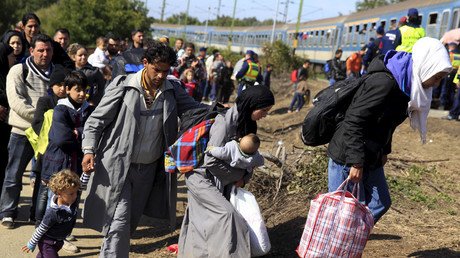‘Absolute madness’: German town to separate refugees, residents with barrier taller than Berlin Wall
A town in Germany is erecting an enormous wall to separate its residents from refugees housed at a local migrant camp. The controversial 4-meter (13.1ft) barrier will stand higher than the Berlin Wall.
Located in the Munich suburb of Neuperlach Sud, the stone wall is aimed at dividing the town’s families from around 160 unaccompanied child refugees who are set to move into a nearby shelter currently under construction.
The wall’s construction is being seen as a compromise between angry residents and the local government after seven locals previously filed a complaint against the shelter, Welt reported.
Those against the shelter have argued that the site will cause the value of their homes to plummet, and have raised fears about noise coming from the site. The nearest houses to the shelter are located 25 meters (82ft) away, and are separated from the construction by trees and a road, according to Ruptly.
The plan to build the wall was agreed by residents and the Munich Administrative Court in June.
While some locals have praised the wall’s construction, others have slammed it – including Deputy District Chairman Guido Bucholtz, who called it “absolute madness,” Merkur newspaper reported.
“I just find it bad,” Bucholtz said, adding that he believes the barrier – which is due to be completed in spring 2017 – will be far too high.
The wall is being seen as particularly significant because it will be higher than the Berlin Wall, which stood at a height of 3.6 meters (11.8ft).
“Munich had to surpass that,” Bucholtz said, adding that “under integration I imagine something different.”
Support for the wall is perhaps unsurprising in Bavaria, with many of the German state’s politicians and residents repeatedly stressing their discontent with Chancellor Angela Merkel’s open-door policy for those fleeing war and persecution.
An October poll found that four in five people in Bavaria have a negative attitude towards Muslims. Only 27 percent of those surveyed were found to have no negative feelings towards refugees.
In August, Bavaria’s finance minister told Spiegel that asylum seekers who entered Germany during the refugee crisis should be sent back to their home countries within three years.
More than 1 million asylum seekers reached Germany in 2015, as part of the biggest refugee crisis since World War II.














